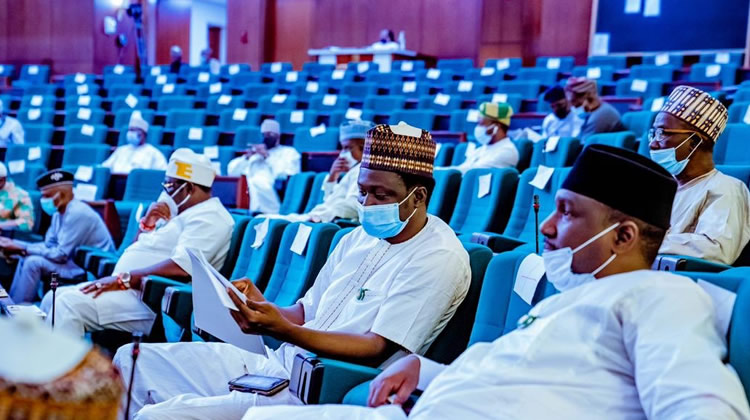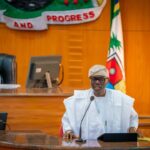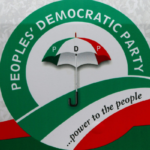
The National Assembly on Wednesday increased the 2023 budget proposal from N20.51tn to N21.82tn and passed it, indicating an increase of over N1.3tn against the N20.5tn proposed by the President, Major General Muhammadu Buhari, (Retd,), in October.
Buhari had on October 7, 2022, presented a budget proposal of N20.51tn to the parliament with a deficit of N10.782tn. He also noted that the 2023 budget would be funded by foreign loans.
Under the N967.48bn statutory transfers, the National Assembly Office has N30.492bn; the Senate got N33.267bn; the House of Representatives, N51.994bn; National Assembly Service Commission, N10.555bn; legislative aides, N16.520bn; general services N11.307bn; National Institute for Legislative and Democratic Studies, N7.411bn.
Others are: N30.173bn for severance/inauguration of outgoing and incoming 9th and 10th Assembly legislators; N10bn for construction of NASC building; N2.5bn for completion of the NILDS headquarters etc.
The new figures N228.1bn approved for the National Assembly as against the proposed N169bn by the president, revealed a surge of N59.1 bn in the lawmakers’ allocation.
Despite an initial increase by the President from N125bn in previous years, to N128bn for 2021, N134bn for 2022 and N169bn for 2023, the lawmakers still did an upward review of their 2023 budget.
Commenting on the issue, the Executive Director, the Civil Society Legislative Advocacy Centre, Auwal Rafsanjani, noted that it was sad that the National Assembly had to budget such an amount that had nothing to do with the public good.
He said, “It clearly shows that the leadership of the National Assembly is not in tandem with the effective management and utilisation of public funds. They are custodians of national resources in terms of ensuring that money budgeted for is properly utilised.
“They should ensure that money is not wasted, diverted, misappropriated nor (allow) anything that will amount to an abuse of resources. He lamented that they went “ahead to budget such an amount for gratuity in the midst of inflation, recession, economic hardship and stress the country is going through.”
Rafsanjani also lamented that the allocation was even unethical, owing to the fact that the lawmakers are getting monthly salaries and allowances.
He added, “It is absolutely unfair to the country. We are crying about funding education, the Academic Staff Union of Universities has been crying for improvement in education and their salaries, and some people are sitting down there budgeting for gratuity.
“What is a severance package if not for another means of stealing and diverting taxpayers’ money? Every month, you get salaries and allowances, so why should you still budget such a humongous amount of money? This is the reason why political violence happens because of these unnecessary monies.”
Rafsanjani added, “There is no way we should be shouting about poverty or lack of funds for development programmes and then we now allowed some few individuals to corner such huge amount of money.
“It is absolutely an unfair and unjustifiable spending. It is unfair and an abuse of public trust that they budget such money. We condemn such spending in total and thorough such allowances known as severance packages both at National and state levels.”
Analysing the situation, he noted that some of the lawmakers in the 9th Assembly when re-elected would get both gratuity and inauguration allowances and still get the same at the end of the 10th Assembly.
Rafsanjani lamented, “That means that at every election, they’d keep getting the severance package. Somebody like the Senate President who has been at the National Assembly since 199 has been getting this money because he’s been re-elected over and over again into the National Assembly.
“This isn’t fair. Why should such a person be collecting such a huge amount of money, it is very unfair. We condemn in total and thorough and we call on well-meaning Nigerians to rise up and call on the discontinuation of this so-called severance package.”
Also, the Chairman, United Global Resolve for Peace, Shalom Olaseni, stated that the Nigerian governance system was terribly flawed and this reflects in what poses as the priority of the elected political class.
He said, “While it goes without saying that a worker is worth his wages, it begs the question of what weight the National Assembly pulls in a legislative tenure for a struggling nation to be indebted to it at such excessive and overwhelming sums.
“It is beyond imagination that any arm of government would conceive and allocate to itself such humongous sums as at dire a moment as now when salaries are delayed, salaries unpaid and the gorge between the rich and poor deepens.
“It is beyond comprehensible that such a proposal would be conceived and entertained at such a time and I must express the hope that well-meaning members of the public and civil society organisations fight it to a standstill.”




